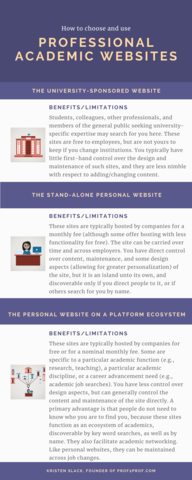- Home
- How to Choose and Use Academic Professional Websites
How to Choose and Use Academic Professional Websites
There is increasing interest among academics in creating professional websites. Three types of professional websites are common for academics, each with their own advantages and disadvantages. Depending on your objective, one may be a better solution than another, or you may find that you need more than one type to accomplish your goals.
THE UNIVERSITY-SPONSORED WEBSITE:
Students, colleagues, other professionals, and members of the general public seeking university-specific expertise may search for you here. These sites are free to employees, but are not yours to keep if you change institutions or retire. You also typically have little first-hand control over the design and maintenance of such sites, and they are less nimble with respect to adding/changing content. Nonetheless, if your college or university provides its academic employees with a professional page on their website, it's a good idea to accept it and check it regularly to ensure it stays up-to-date.
THE STAND ALONE PERSONAL WEBSITE:
These sites are typically hosted by companies for a monthly fee (although some offer hosting with less functionality for free). The site can be carried over time and across employers. You also have direct control over content, maintenance, and many design aspects (allowing for greater personalization) of the site. However, it is an island unto its own, and discoverable only if you direct people to it, if others search for you by name, or if you happen to excel at search engine optimization. If your goal is to have people find your work, even if they do not know you or know of you, a standalone website may not be the best solution for you.
THE PERSONAL WEBSITE ON A PLATFORM ECOYSYSTEM:
These sites are typically hosted by companies for free or for a nominal monthly fee. Some are specific to a particular academic function (e.g., research, teaching), a particular academic discipline, or a career advancement need (e.g., academic job searches). You may have control over some design aspects but typically the format is pre-determined, However, just as with a standalone website, you can generally control the content and maintenance of the site directly. A primary advantage is that people do not need to know who you are to find you or your work because these sites function as an ecosystem of academics, discoverable by key word searches, as well as by name. They also facilitate academic networking. Like personal websites, they can be maintained across job changes.
There are many options for academics interested in creating professional websites. It's important to consider how you plan to use a professional website as an academic--there may be a need for more than one, depending on your objectives. Prof2Prof offers a platform ecosystem where academics can have their own website, with the added advantage of being part of a larger ecosystem of academics. Additional advantages include being interdisciplinary, inclusive of a broad range of academic resources rather than a single type, and free to join if you are a professor, instructor, researcher, administrator, student support professional, doctoral student or postdoc in higher education.
Whatever you choose, it is important to promote your work and your expertise. Your contributions to your discipline, to higher education, and to society at large are worth sharing.

